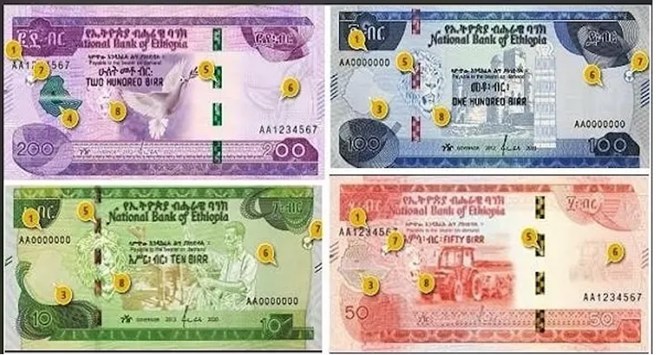
Thursday February 2, 2023

In 2020, Ethiopia carried out a demonetization of its currency and Somalia has recently announced that it would carry out a demonetization of its currency. Demonetization is the process where governments withdraw bank notes and/or coins from the market and replace them with new ones. This is generally done by least developing countries for either economic or political reasons.
When a currency is demonetized, it assists in encouraging people to keep less cash outside the banking system and hence encourages savings and investment culture in a country. It helps governments receiving and/or collecting more revenues and hence expands its ability to spend more on public projects.
The central bank of Ethiopia, the Bank of Ethiopia, criminalized the hoarding of cash outside the banking system to stop the flow of cash outside the banking system, when many panicked during Ethiopia’s political turmoil in the period prior to the demonetization process and withdrew a lot of cash from the banking system. Somalia’s Central Bank, in fact, started the process of demonetization in 2018, according to Ali Yassin Wardhere, an executive of the bank who was talking to Xinhua news agency recently, with the support of the International Monetary Fund and the World Bank.
Somalia says that it will remove counterfeit bills, reducing the amount of money notes in the market to address inflation by mid 2024. Ethiopia did it in 2020. However, in the case of Ethiopia, the process was smooth, less disruptive to the economy, though it irked many politicians and, of course, those who were benefitting from the chaos. It could have been one of the reasons that led to the war in Tigray as many people accuse the government of having made them bankrupt.
Central banks generally retain a portion of people’s bank deposits and allow the financial institutions it controls, to lend out the rest into the market. The rate at which deposits invested is capitalized and/or monetized is called the capital Adequacy ratio and ranges from low figures of below 10% to as high as 30%. In some cases, some central banks only keep the capital of the lending institutions as the fractional reserve, instead of a fraction of deposits with the bank.
The demonetization process usually benefits commercial banks and the government, whereas the commercial banks would get more monies to lend out and the governments get more control over the supply of money in the markets. The process affects adversely those individuals and corporations that have horded large amounts of illegal monies. Illegal monies are one of the primary reasons for inflation and in Somalia there is plenty of illegal monies being bumped into the economy and no wonder the inflation rate is skyrocketing. Many of the regions of the country print new notes for themselves without central bank controls and hence, this affects, for example, hikes in real estate and car sales prices and prices of many other commodities.
Illegal or illicit monies result from activities that are illegal. They include among others fraudulent transactions, drug trade, prostitution, counterfeiting and money laundering. These activities usually thrive where enforcement laws and institutions are generally weak and respect for the rule of law and ethical values is almost non-existent. Somalia’s law enforcement and ethical values have been reduced to almost non-existence through the continuing civil strives in the country, where terror groups and the clan represent power instead of the government. No wonder counterfeit notes of the Somali Shilling are supplied into the market continuously.
Now the Federal Government of Somalia says it would supply into the market new notes in the denominations of 1,000, 2,000, 5,000, and up to 10,000 shillings. However, none of the factors that led to the illegal monies in the country have been addressed as yet. The Federal government is not in control of the country, regional states sway control and more power than the federal enforcement institutions in their regions and some of them are actually the source of most of the counterfeit currencies in the country. The country’s constitution is still at the drafting stage and incomplete and hence the rule of law does not exist. Every move and act in the country with respect to law remains to be at the whims of those who claim to be in power.
It is perhaps, why there is need to address many other matters before demonetizing the Somali Shilling. The danger of a continuation of the civil strive and clan wars cannot be ruled out or the disintegration of the federal system that Somalis are now proud of and hence advent of a new phase of the country’s woes.
The demonetization process may only breed new corrupt groups and institutions who would replace the old ones. This would neither better the economy nor instill respect for the rule of law in the country. It is hoped that the Somali Federal Government would not embark on another ill-fated wishful processes. It should deal with completing and strengthening the weak governance of the state. Sister countries of the Horn of Africa States of Ethiopia, Eritrea and Djibouti can and would help should Somalia seek out their assistance and there is where the need for a regional block that supports its members, when one is in trouble, is not only required but a necessity.
--
Dr. Suleiman Walhad writes on the Horn of Africa economies and politics. He can be reached at [email protected].